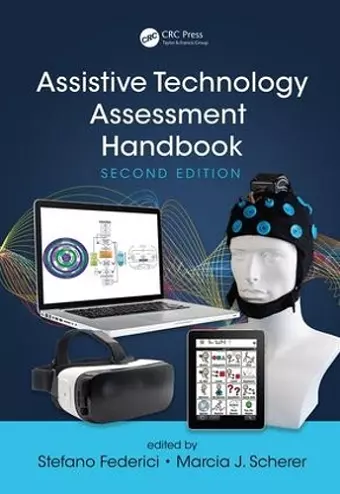Assistive Technology Assessment Handbook
Stefano Federici editor Marcia Scherer editor
Format:Hardback
Publisher:Taylor & Francis Inc
Published:5th Dec '17
Currently unavailable, and unfortunately no date known when it will be back

Assistive Technology Assessment Handbook, Second Edition, proposes an international ideal model for the assistive technology assessment process, outlining how this model can be applied in practice to re-conceptualize the phases of an assistive technology delivery system according to the biopsychosocial model of disability. The model provides reference guidelines for evidence-based practice, guiding both public and private centers that wish to compare, evaluate, and improve their ability to match a person with the correct technology model. This second edition also offers a contribution to the Global Cooperation on Assistive Technology (GATE) initiative, whose activities are strongly focused on the assistive products service delivery model. Organized into three parts, the handbook: gives readers a toolkit for performing assessments; describes the roles of the assessment team members, among them the new profession of psychotechnologist; and reviews technologies for rehabilitation and independent living, including brain–computer interfaces, exoskeletons, and technologies for music therapy. Edited by Stefano Federici and Marcia J. Scherer, this cross-cultural handbook includes contributions from leading experts across five continents, offering a framework for future practice and research.
"The book provides a policy-driven, theory-guided and evidence-based approach to the assessment of assistive technology. It is contemporary and engages with the global discourse in this field."
—Johan Borg, Lund University, Sweden
"This new edition covers all aspects related to Assistive Technology service delivery, taking a global perspective. It may represent a useful resource for professionals with different cultural backgrounds as well as students or academics that want to advance their understanding of the main principles that drive the provision of any assistive device."
—Lorenzo Desideri,Center for Assistive Technology – AIAS Bologna, Italy
"In the 2nd edition of the Assistive Technology Assessment Handbook, Federici and Scherer have assembled some of the best minds in assistive technology who provide an extraordinary breadth of integration of theory, models of the assessment process, assessments for individuals with diverse abilities, and assistive technology devices. This book is sure to become the key resource for those interested in researching, assessing, implementing, and evaluating the use of assistive technology devices across diverse areas. It presents new and exciting ways of thinking about the use of assistive technology for enhancing the wellbeing of people with a variety of disabilities."
—Nirbhay N. Singh, Medical College of Georgia, Augusta University, Augusta, GA, USA
"…a valuable source of information and a compelling reading. Determining the best possible match between individual and technology is a complex and relatively obscure task, and this book provides the reader with detailed guidelines to carry out such a task successfully."
—Giulio Lancioni,University of Bari, Italy
"…an important and timely update of the definitive handbook of research and practice in the use of assistive technology for the rehabilitation of people with disabilities. This handbook is an invaluable resource for researchers, clinicians, and students in the disability and rehabilitation fields that should be on every desk of every researcher and clinician working with assistive technology."
—Jeff Sigafoos,Victoria University of Wellington, New Zealand
"A great book to let readers know about the numerous fields of application of assistive technology."
—Carlo Ricci, University Pontificia Salesiana and Walden Technology of Rome, Italy
"The authors have taken a measured approach that focuses on the individual with respect for the various experiences of people who would benefit from a well-conceptualized and implemented AT assessment. This person-centered approach takes into consideration many different areas of expertise, and braids them together in a way that will allow people who would benefit from assistive technology, teachers, parents, therapists, medical professions, and rehabilitation specialists, among others, to develop and implement assistive technologies that will remove environmental barriers and allow people to live their fullest lives."
—Helen Malone, The Ohio State University, Columbus, Ohio, USA
ISBN: 9781498774116
Dimensions: unknown
Weight: 1250g
512 pages
2nd edition